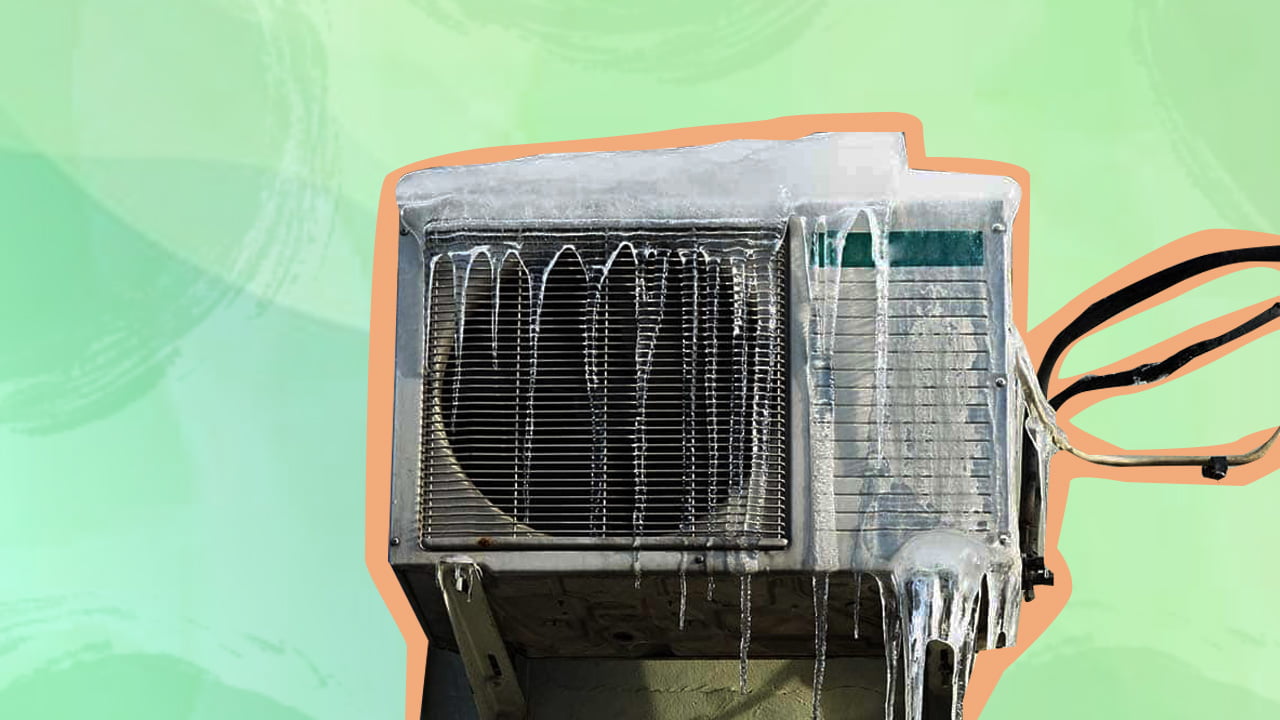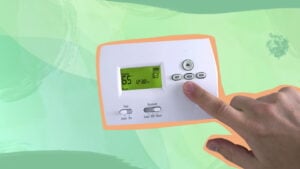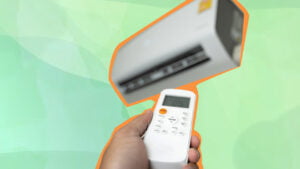Running an air conditioner under 65 degrees can help you combat the cold and improve indoor air quality. However, it comes with several risks that may cause damage to the internal parts, including the compressor, evaporator coil, and heat pump.

So, you want to run your air conditioner in cold weather to maintain optimal temperature without investing in an electric heater? Well, that’s a totally plausible option, given air conditioners these days have heating and dehumidifier features in addition to basic cooling.
But it’s wise to remember that you can cause irreversible damage to your AC unit if it runs at low temperatures for a long time. However, there are ways you can minimize the risks and improve the unit’s overall longevity. Read on.
Benefits of Running AC Under 65 Degrees

Even though there’s a high chance of inflicting cold weather damage if you run air conditioners below 65 degrees Fahrenheit, there are some benefits you can gain from it. They are:
A. Improved Comfort Levels In The Home
While it’s essential to keep your home cool in the summer, cold weather calls for some warm air to protect you from the freezing outdoor temperature. And during cooler weathers, an air conditioning system can help promote air circulation, reduce humidity, and increase indoor temperature by a few degrees. This way, you can improve the comfort levels at home without having to buy a separate unit for heat production for the colder months.
B. Potential Cost Savings On Energy Bills
Using an air conditioning unit during low temperatures below 60 degrees Fahrenheit can remove the need to buy a room heater. And heating appliances have higher energy costs than air conditioners, as they don’t have energy efficiency ratings or smart compressors.
I’ve been immensely relieved to find that my energy bills have been reduced after I stopped using the old-school, chunky electric heaters during winters.
C. Protection Of Sensitive Equipment Or Materials
Besides improving your comfort levels, an air conditioner can protect sensitive equipment and materials like musical instruments, books, weather-sensitive machines, plants, etc. Some of these things need to be kept at a comfortable temperature in order for them to survive or function properly. And running your air conditioning system at cooler temperatures can help you maintain them for prolonged periods.
Drawbacks of Running AC Under 65 Degrees
Any temperature below 60 degrees Fahrenheit is not the ideal AC temperature and can cause damage to most units. Moreover, some units aren’t meant to be turned on during cooler temperatures. For example, an AC with an outdoor condensing unit may suffer severe damage in cold weather, as the outside temperature is usually much higher. That’s why ventless portable air conditioners are better suited for these weather conditions.
However, if your air conditioner uses lighter-grade oil, it can function even in low temperatures; but this may affect its cool air production in the summer, as it won’t thicken as much. For your better understanding, here’s why running air conditioners under 65 degrees is a bad idea:
A. Increased Risk Of System Failure
Typically, the lubricant of AC units is specifically designed to help heat pumps function during the summer. When the outside temperature is below 60 degrees Fahrenheit, this liquid thickens, preventing the heat pump and evaporator coil from properly functioning. It's the same situation as when your car doesn’t have enough fuel to lubricate the pistons.
In this instance, your air conditioning unit has to work twice as hard, which can cause internal wear and tear, leading to mechanical failure.
B. Reduced Lifespan Of The AC Unit
Besides the obvious potential of compressor damage, there’s the issue of weather sensors. Most HVAC manufacturers include this sensor in their units to help you conserve more energy and save money. However, this feature may not allow you to turn on your air conditioner on colder days when the temperature drops below 65 degrees.
If you have an older model that doesn’t have this sensor, you’ll be able to run the AC, but it will damage the unit and prevent liquid migration if the temperature is too cold.
C. Higher Energy Consumption And Associated Costs
Even if your air conditioner is working well in winter months and removing cold air from the space, the indoor coils may freeze up and form ice particles in the refrigerant. What’s more, the Freon gas will have a hard time circulating in the unit, causing severe damage to the system.

Factors to Consider Before Running AC Under 65 Degrees
A. Climate And Humidity Levels
When operated at an ideal ‘ambient temperature,’ you can efficiently use an air conditioner for heating, ventilation, and air conditioning. This is a technical phrase used to denote the recommended temperature for the compressor and coils to function properly. As a general rule, running air conditioners at 65 degrees or lower is not advisable due to its various drawbacks.
Moreover, it's important to check the humidity levels in your room before you operate the AC. But don't air conditioners also help decrease humidity? Yes, they do, but excess moisture in the air can cause issues like rust and malfunctioning of the liquid refrigerant. If you want to avoid this, it’s best to reduce the humidity to a certain level - using ceiling fans (or box fans if you prefer high-speed airflow) before turning on the AC.
B. Type And Age Of The AC Unit
Older units run a higher risk of damage since their internal compressor and other mechanical parts may be already worn out with usage. In contrast, new air conditioners will work better in cooler temperatures, as they’re more powerful and can run on lower amounts of refrigerant.
When it comes to functioning in cold weather, the type of AC unit must be considered. For example, portable units where the entire system is inside your home will last longer in colder weather, as they aren’t exposed to the outdoor temperature. Meanwhile, mini splits with their outdoor units may risk damaging their internal system.
C. Level Of Insulation And Sealing In The Home
Home insulation and sealing prevent heat transfer in and out of your home, reducing heating and cooling costs. Since these act as barriers between indoors and outdoors, your room will be much warmer in the cold months and cooler in the warm season. This way, you won’t have to run your air conditioner at 65 degrees for a long time to balance the temperature inside.
Tip
It’s advisable to get your home insulation checked by professionals before every winter - this ensures heat retention during the season, so you wouldn’t need to use the air conditioner as often.
Tips for Running AC Under 65 Degrees Safely and Efficiently
A. Regular Maintenance And Inspections Of The AC Unit
By conducting regular inspections, you can limit the damage caused by running an air conditioner under 65 degrees Fahrenheit. It’s better to call a professional service to clean the internal machine and refill the oil or refrigerant if needed. This way, you can stop the damage at the roots and prevent it from spreading.
B. Use Of Programmable Thermostats To Regulate Temperature
Another way you can save money and energy is by purchasing AC units with programmable thermostats. Simply set it at 60 degrees or above so that it stops the compressor fairly quickly once the desired temperature is reached. This helps prevent air conditioners from running too long and consuming energy unnecessarily.
C. Proper Insulation And Sealing Of The Home
Check your home insulation and sealing to see if there’s any unwanted air leakage. If you haven’t revamped the insulation for years, consider getting it done before the winter so you won’t have to rely on air conditioners for long.

Final Thoughts
Running an air conditioner under 65 degrees helps maintain good indoor air quality and keeps you comfortable throughout the day. It also aids in maintaining weather-sensitive equipment and materials that require a particular temperature and humidity range to survive. However, there are various downsides to this practice - and honestly, the damage can be quite severe.
This is why you should carefully consider the cooling and heating capacity as well as the different features of your air conditioner to see if it can function at such temperatures. And if you’re going to run it anyway, always take precautions and use the energy-saving tips to avoid damaging your air conditioning unit.
If you liked this informational guide, stick around for similar updates. Until then, goodbye!
